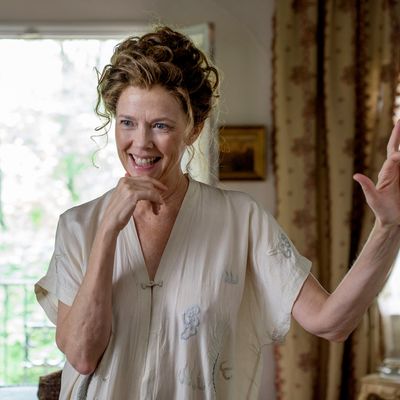
As he demonstrated in The Seagull and would refine in the three arguably greater dramatic masterpieces that followed, Anton Chekhov had a genius for transforming seemingly idle conversation into music, with every instrument noodling away in its private sphere and yet somehow coalescing into a melancholy human symphony.
The new film adaptation, directed by Michael Mayer from a script by Stephen Karam (who wrote the ghostly, neo-Ibsen drama The Humans), pares down the chitchat and breaks up some of that ensemble flow. The narrative beats are heavy, reaction shots abound, and wordless discursions are numerous. The intent, of course, is to make a movie rather than another stodgy piece of filmed theater, with the result that some of Chekhov’s music is lost — but that a surprising amount of tension is gained. Above all, Mayer’s The Seagull is a platform for several definitive performances.
Chief among those is Annette Bening’s Arkadina, the aging actress who returns to her estate on a lake outside Moscow with her lover, the celebrated short story writer, Trigorin (Corey Stoll). There awaits her high-strung son, Treplev (Billy Howle), eager to show off his own artistry, a symbolic dream play he intends as a challenge to the classical theater in which his mother made her name. Given that it’s a provocation, it shouldn’t surprise him that Arkadina makes stinging comments, but he stomps off into the woods while Arkadina asks, with feigned ingenuousness, “What did I do?”
“What did I do?” makes my blood boil every time. Arkadina is one of literature’s most narcissistic mothers — which is saying something, given how much of the Western canon is revenge on Mom. But Bening makes her damnably human. No actor is better at suggesting the tension between the public persona and the desperate soul beneath, struggling to hold the mask in place. Bening’s Arkadina puts all her acting wiles into convincing her family, maybe even herself, that her fame and youthful good looks are at their peak. How deluded she remains about her miserliness in the realms of both money and mother love. And how hungrily she monitors her lover Trigorin’s responses, so dependent on the famed author to complete her that she pays scant attention to the son who begs her to complete him. No wonder Treplev has a Hamlet complex.
A character lamely jokes that unrequited love happens only in plays, and this one is a riot of the unrequited: One person loves another who loves a third, each longing to fill an essential emptiness. Mayer and Karam’s swift pacing brings out Chekhov’s farcical underpinnings. Watch Elisabeth Moss’s Masha, the floridly forlorn daughter of the estate manager, trail after Treplev, who trails after his actress-muse Nina (Saoirse Ronan), while the hapless school teacher (Michael Zegen) trails after Masha — observed by Masha’s mother (Mare Winningham), who pines for the middle-aged doctor, Dorn (Jon Tenney). The actors are all you could wish for and Moss is something more. Swilling vodka more and more openly, she gives Masha a tragic awareness — and a hint of the demonic.
Watching this The Seagull, you see how Chekhov — physician, famed author, struggling playwright— split himself into three: Dorn, the sympathetic healer who wishes he could minister to sick souls; Treplev, the show-boater obsessed with new artistic forms to express human suffering; and the celebrated Trigorin, a borderline vampire who constantly takes notes on people he’ll transform into characters. Trigorin (whom Stoll underacts cunningly, as a man who guards his energy) is Chekhov’s warning to himself of what happens when artistic dispassion interferes with empathy.
Howle looks and acts like too much of a soap stud to fully convey Treplev’s inner flip-flops, but he’s intense, and he and Bening do a bang-up job in the bandaging scene, in which Arkadina ministers to Treplev’s self-inflicted gunshot wound and ends up ripping off whatever emotional scabs her son has formed. As Arkadina’s elderly brother, Sorin, Brian Dennehy is merely perfect. He has the serenity — and morbid humor — of a man who knows he’s on his way out.
The lone disappointment is Ronan, who’s never less than magnetizing but turns out to be limited in a way I hadn’t anticipated: She can’t fully give herself to a character she doesn’t respect. She plays the early Nina as a mindless romantic, blushing at her proximity to fame, while the Nina of the final act, beaten down by two years of crushing emotional trials, is too guarded. The role is admittedly a killer. I’ve seen half a dozen actresses go down in flames and even Vanessa Redgrave — in Sidney Lumet’s over-effusive film, in which character keep taking one another’s heads in their hands — got only halfway there. The exception was Carey Mulligan, who evoked the tragedy of a woman simultaneously opened up and destroyed. (She got double points since her Treplev was Gareth from the original British The Office — a born Uriah Heep.)
Mayer and Karam keep their touch relatively light until the end, when they do two things that are very smart and one that’s unforgivable. They eliminate the last words of the play, now redundant. They close on Arkadina, who knows in her bones what has happened — and Bening has made an art of such shots since her wordless but epic reaction to news of her boyfriend’s death in Bugsy. The unforgivable: repeating, in voice-over, a line from Treplev’s allegorical play. It works, as cheap tricks can. But repurposing the words of a soulful but pretentious young character as an epilogue for the whole play is using Chekhov’s dramatic instincts against him. A more histrionic critic would call for Mayer to be beaten on the kidneys with a stick and forced to remove the offending line. I’d settle for his removing the line.
*A version of this article appears in the May 14, 2018, issue of New York Magazine. Subscribe Now!


